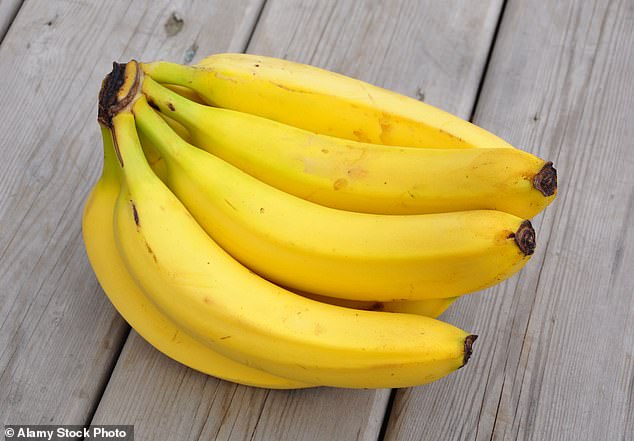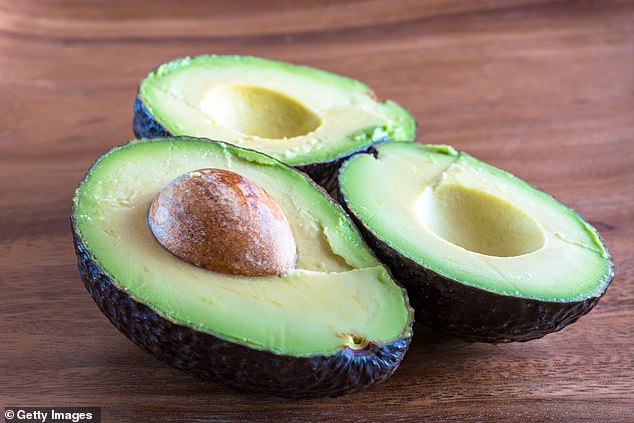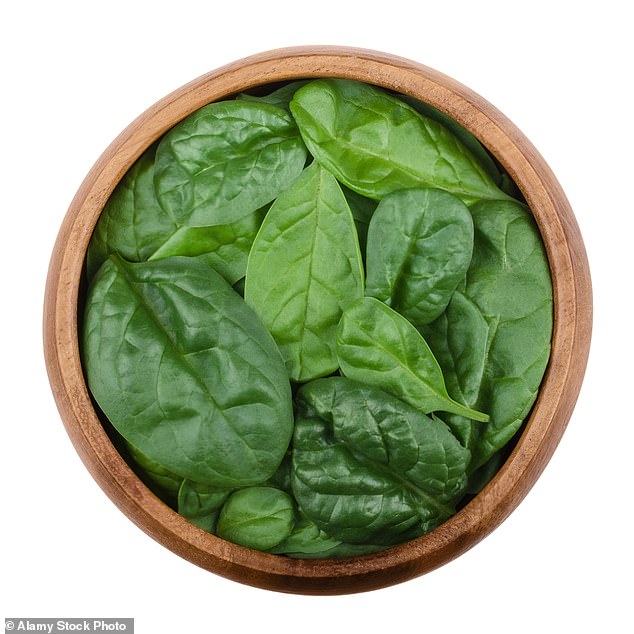A diet rich in bananas, avocados and spinach can slash the risk of heart failure and death by almost a quarter, a study suggests.
Doctors found boosting patients’ intake of potassium through dietary changes, supplements or drugs significantly improved their heart health.
But they told the European Society of Cardiology conference in Madrid that a diet high in the mineral ‘may not only benefit patients with heart diseases but probably all of us’.
It comes after the UK National Diet and Nutrition Survey—published in June—revealed a third of teenagers and a quarter of adults are at risk of potassium deficiency.
Researchers from Copenhagen University Hospital conducted a trial involving 1,200 patients with implantable defibrillators, with half given standard care and half helped to increase their intake of potassium.
This led to a 24 per cent reduction in sustained irregular heartbeats, hospital admissions for irregular heartbeat or heart failure, or death.
Senior author Professor Henning Bundgaard said: ‘With a broader view we can say that higher dietary intake of potassium may not only benefit patients with heart diseases but probably all of us, so maybe we should all reduce sodium and increase potassium content in our food.
‘The human body evolved on a potassium-rich, sodium-poor diet – when we were born and raised on the Savannah and eating fruit and vegetables.

Bananas are a naturally rich source of potassium

Avocados are also packed with the heart-boosting mineral
‘We now tend to go to a modern diet that is processed foods. The more processed we see, the more and more sodium in the food and less potassium, meaning the ratio between the two has changed from 10:1 to 1:2 – a dramatic change.
‘Potassium is crucial for cardiac function and we know from observational studies that low potassium increases the risk of arrhythmias and heart failures and death.
‘We also know that potassium can be increased.
‘If we go below the normal range there is a marked increase in cardiovascular events. Even within the normal range we have a higher risk at low-normal potassium compared to high-normal.’
He added: ‘We have a list of foods that we gave to the patients – white beets, beetroots, cabbage and so on are all high-content potassium-rich diets.
‘We did not recommend meat, which is also potassium rich, because it is also rich in sodium and counter-interacts the increase in potassium.’
The findings of the POTCAST trial were simultaneously presented at the conference and published in the prestigious New England Journal of Medicine.
Patients helped to increase their potassium intake saw their levels rise from under 4.3 mmol/L to 4.5mmol/L.

Low potassium increases the risk of arrhythmias and heart failures and death
Some 6.7 per cent of the intervention group were hospitalised due to an irregular heartbeat and 3.5 per cent experienced heart failure, compared with 10.7 per cent and 5.5 per cent, respectively, in the control group.
Dr Sonya Babu-Narayan, clinical director at the British Heart Foundation and consultant cardiologist, said: ‘Many people in the UK are living with an implantable cardioverter defibrillator, commonly known as an ICD.
‘These automatically shock your heart if it goes into an abnormal and life-threatening rhythm.
‘While having a shock may save your life, the experience can be unpleasant for some people.
‘This trial from Denmark found that increasing blood potassium levels into the high normal range in people with ICDs improved patient outcomes, and importantly reduced their chances of needing a shock.
‘If you’re advised by your doctor to improve your dietary potassium intake, you can do this by including more vegetables and fruit rich in potassium such as spinach, bananas or avocados in your diet, as well as pulses, fish, nuts, and seeds.
‘Don’t be tempted to try to increase your potassium intake with supplements unless supervised by your doctor, as ending up with too high a potassium level is dangerous – for example it can cause cardiac arrest.’
In 2023/24 over 7,000 new ICDs were fitted in the UK.

Other key foods are spinach, lima beans, baked potato, yoghurt, banana and tuna
Commenting on the findings, dietitian Dr Carrie Ruxton said: ‘Everyone knows about cutting down on salt, but few people realise that increasing potassium is almost as important for preventing strokes and heart attacks.
‘The European Food Safety Authority highlighted a lack of potassium across Europe as a major diet concern.
‘In the UK, the latest National Diet and Nutrition Survey shows that a third of teenagers and a quarter of adults are at risk of potassium deficiency, with implications for blood pressure control and muscle function.
‘We can do more individually to boost our potassium intakes by eating more fruit, vegetables and fish.
‘Fruit juices are particularly rich in potassium.
‘A study published in Nutrients found that starting the day with a glass of orange juice provides 10 to 15 per cent of our daily potassium needs.
‘Other key foods are spinach, lima beans, baked potato, yoghurt, banana and tuna.’
A banana contains around 500mg of potassium, half a baked potato contains around 600mg and a cup of raw spinach around 450mg.
The National Institutes of Health recommends that adult males should consume 3,400mg of potassium daily and adult females should consume 2,600mg.
Pregnant or breast feeding women should consume significantly less and should consult a specialist if concerned.
Typically concentrations of potassium in the blood range from about 3.6 to 5.0 millimoles per litre (mmol/L).












